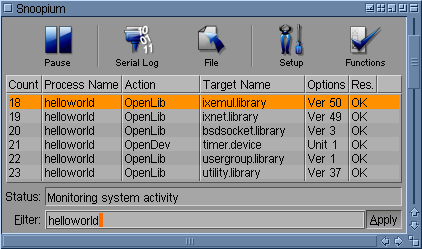The First Traditional "Hello world!"
From MorphOS Library
Grzegorz Kraszewski
"Hello World!" With the Standard C Library
With the standard C library, one can use the "Hello World!" example exactly as found in a C handbook. It is given below, just for completness:
#include <stdio.h>
int main(void)
{
printf("Hello World!\n");
return 0;
}
This source may be copied to a text editor and saved as helloworld.c. To compile it, one opens a shell window (from Ambient menu, or using rcommand + n key combo) and changes current directory to the one, where C source is located. The compiler is ran as follows:
gcc -o helloworld helloworld.c
The compiler produces helloworld executable, which has 10 340 bytes on my system. Note that MorphOS pays little attention to filename extensions, so ending the executable name with .exe is not needed, however possible. Traditionally MorphOS executables are named without any extensions. The -o compiler option specifies desired executable name. If this option is not given, the executable will be named a.out (for some historical reasons).
As stated in the SDK section, the standard C library will be delivered by ixemul.library. It can be easily confirmed by tracing disk activity of helloworld using Snoopium tool.
It can be also seen that many other libraries are also opened including ones related to TCP/IP networking. It looks like overkill for such a small program. This happens, because ixemul.library creates a complete unixlike environment for the application, which is not needed in this simple case. That is why libnix alternative is recommended for the standard library. To use it, a -noixemul option has to be added, so the compiler is called as follows:
gcc -noixemul -o helloworld helloworld.c
